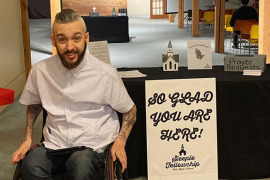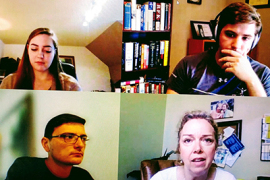Three Tactics to Help You Prepare for Recovery After a Natural Disaster
With Hurricane Florence bearing down on much of the Southeastern U.S., flooding in Wisconsin, fires burning in California, and recent gas explosions in Boston, many families have either evacuated their homes or are hunkered down, preparing for the worst.
But while survival tips for those affected are flooding the internet, information on picking up the pieces after a devastating natural disaster is sparse.
How does life after loss become the new normal? And if you or your family are not in the path of a catastrophe now, what can you do now to prepare yourself — and your community — for a healthy recovery when an ice storm, tornado, fire, flood, or terrorist attack comes to your area?
Resilience is the ability to bounce back after a difficult experience. And while there are some very practical steps you can take to boost your resilience, many resilience-boosters are personal. The higher your resilience, the more easily you’ll be able to recover from any crisis that comes to your doorstep. How?
Prepare yourself
Preparing yourself is all about setting your mind to deal with the task at hand. On a practical level, that means making an evacuation plan from your home, storing important documents in a safe place, and having an emergency kit well-stocked and available.
Know the potential hazards that may come with a disaster (loss of power, inability to leave your home, or evacuation, etc.), and make a plan for each one.
Have supplies on hand for 3-5 days if you could be trapped inside, know where to go and have up-to-date contact information and routes available if you’re forced to leave, and keep emergency cash with you in case a power outage downs ATMs or credit/debit card readers.
On a personal level, determine to remain positive and be adaptable to change. Look for at least one thing you can be thankful for. Then another. For every disheartening event and discovery, find one unexpected blessing to balance it.
While being realistic about your situation will help you keep a clear head, resolve that you will not allow despair at your situation to overwhelm you, no matter how difficult things get.
Look for meaning within the crisis — what are you learning? How is the situation making you stronger? Store those lessons up for the future. Hardship often makes us better, so don’t miss the opportunity to grow through it.
Prepare your household
A steady cycle of prevention, preparedness, response, and recovery will help you weather a crisis more easily by making your home and your family ready for it. Practically, this means keeping up with important home repairs and being covered by enough insurance.
Do you live in an area prone to flooding? Remember that flooding is not covered by basic homeowners or renters insurance and requires a separate flooding policy. Take pictures of each room in your home and keep an inventory of expensive items for potential insurance claims.
If you have children, create a checklist so that formula, diapers, toys, food, games, and special comfort items are not forgotten if you’re forced to leave quickly. The same applies to medication, glasses, prosthetics, and special food for elderly members of your family and food, water, vet records, a photo, leash, toys, and a crate or carrier for your pets.
Personally, commit to staying flexible and compassionate — a crisis is trying for everyone, and words spoken in stressful situations cannot be taken back. Remind each family member of the important role they play in helping one another get through this difficult situation and use collaborative problem-solving whenever possible.
Remember that you don’t have to endure hardship alone. Identify support networks like community centers, neighbors, friends, or a church ahead of time and get plugged in as soon as you can.
Prepare your community
The healthier a person is, the more easily they will bounce back from a crisis. The same is true for communities. The stronger the socio-economic, physical, and psychological well-being of a community, the better it will not only respond to a crisis but also recover from it.
Resilient organizations and communities are more sustainable — and require less extensive recovery operations after a disaster, which means they also save money.
What can you do to prepare your community for healthy recovery from a disaster?
Find ongoing public education on preparedness measures, risks, and disaster response resources and share the information with as many people as you can.
Identify which areas of preparedness are an individual’s responsibility and which belong to the community before a crisis happens, so that everyone understands which role they should play when it comes.
Find partnerships between the community, local government, and nongovernmental organizations (NGOs) and strengthen them where you can.
Those who are vulnerable are most affected by a natural disaster, so look for people in your neighborhood or social circles who might need help.
Is there an elderly person living alone in your area? A single parent? Someone with consistent health issues or a handicap? Take the opportunity to build relationships now so you can support them if they need your assistance during a crisis. You may be their only support network.
Make choices leading to future resiliency now
While no one wants to believe they could be significantly impacted by a disaster, the truth is that nature is cyclical — hurricanes, fires, tornados and floods destroy thousands of homes every year. And if you’re living in an area that is not prone to these dangers, you and your family are still susceptible to non-natural disasters like accidents and terrorist attacks.
Making choices now that lead to resilience in a crisis can make recovery much smoother and your new normal less intimidating.
Want to make a living out of helping people through difficult situations? Liberty University’s Master of Public Administration in Disaster Management might be what you need to begin a fulfilling career. Or consider a bachelor’s or master’s degree in military resilience (undergraduate and graduate certificates also available).
First responders are eligible for a 25% tuition discount and military members, veterans, and military spouses are eligible for military rates of $250/credit hour for undergraduate courses and $275/credit hour for graduate courses. Thank you for all you do to keep individuals, families, and communities safe when disasters strike.
>>>Request for Liberty University Online degree info now.






